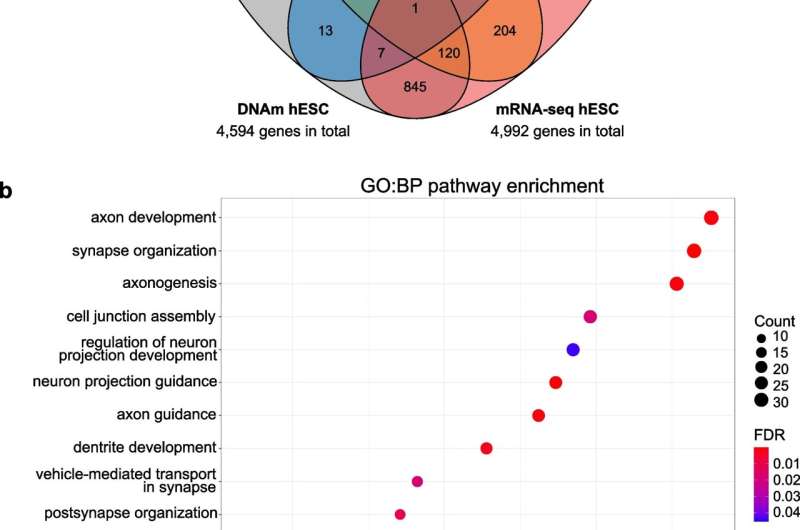- [email protected]
- 27-31 Wright St, Clayton VIC 3168
- Contact
03Jan
Early prenatal alcohol exposure affects genes involved in embryonic development
by Elazadeh, 0 Comments


Common alcohol exposure-associated genes in the genome-wide analyses. a Venn diagram showing the number of common genes, which associate with alcohol exposure in the genome-wide DNAm and mRNA-seq analyses of placenta and hESCs. b Significantly enriched terms identified in GO:BP enrichment analysis of 494 common genes in DNAm analyses of placenta and hESCs (FDR-corrected q-value BMC Medicine (2022). DOI: 10.1186/s12916-022-02699-1
Alcohol exposure in early pregnancy can change gene function during the tightly regulated embryonic development, and consequently cause developmental disorders—especially neurodevelopmental disorders. Novel information on the effects of early alcohol exposure was gained by studying alcohol-exposed human placentas and cultured human embryonic stem cells.
Genome-wide effects of prenatal alcohol exposure on the gene function and the epigenome of placenta was studied for the first time in the University of Helsinki, Finland. Epigenome is a molecular layer on a DNA strand regulating the expression of genes. DNA methylation, which was the focus of this work, is the most well-known epigenetic regulator.
A cohort of 80 alcohol-exposed and 100 control newborns was collected in collaboration with MD Hanna Kahila, specialized in antenatal substance use care, in Helsinki University Hospital. When the placental epigenomes of prenatally alcohol-exposed newborns were compared with controls, significantly decreased amounts of DNA methylation were observed.
To study the early effects of alcohol exposure, the placentas of newborns from mothers who consumed alcohol up the gestational week seven at maximum were selected for separate analyses. Furthermore, to explore the effects of alcohol exposure on the first human cells, human embryonic stem cells were exposed to alcohol during culturing.
“We observed similar alcohol-associated alterations in DNA methylation in placenta and in cultured human embryonic stem cells,” says doctoral researcher Pauliina Auvinen.
This indicates that the observed alterations are associated with alcohol exposure, not with maternal smoking or other environmental factors during pregnancy. These kinds of confounding effects are difficult to exclude in any human study.
Although the newborns exposed to alcohol in early pregnancy did not differ from the controls in terms of birth weight or height, they had a significantly smaller head size. According to the researchers, this may suggest adverse effects of early prenatal alcohol exposure on brain development. Also, along with the observed epigenetic changes, this emphasizes the importance of the early intra-uterine environment for fetal development.
‘Epigenetic fingerprints’ of alcohol exposure enable early diagnosis of developmental disorders
According to the current study, the genes with alcohol-associated DNA methylation changes in both placenta and embryonic stem cells were especially linked with the development of nervous system.
“Alcohol induced similar changes in DPPA4 gene in the placenta and in embryonic stem cells differentiated towards neural cell lineages. This gene is only expressed at the very beginning of embryonic development and the produced protein facilitates the cells to differentiate. It is therefore a necessary gene for embryonic development,” states Nina Kaminen-Ahola, the leader of the study.
Moreover, alcohol exposure was associated with DNA methylation changes in FOXP2 gene, which is needed for the development of speech regions in the brain during embryogenesis.
“Both these genes affect large gene regulatory networks and development. Alterations in their functions may disrupt the tightly regulated embryonic development and consequently cause a wide variety of developmental defects. Since these alterations occur in the early development, they can remain as the epigenetic memory of cells and be potentially transmitted to different cell and tissue types along cell divisions,” Kaminen-Ahola says.
Researchers propose that these universal alterations, “epigenetic fingerprints” of prenatal alcohol exposure, could be future biomarkers, which would enable early diagnosis and personalized support for the development of the affected children.
Prenatal alcohol exposure causes a wide variety of birth defects, which are known as FASD, Fetal Alcohol Spectrum Disorders. Alcohol is one of the main causes for neurodevelopmental disorders. Diagnosing the defects caused by prenatal alcohol exposure is difficult and the real number of affected children is not known.
More information:
P. Auvinen et al, Chromatin modifier developmental pluripotency associated factor 4 (DPPA4) is a candidate gene for alcohol-induced developmental disorders, BMC Medicine (2022). DOI: 10.1186/s12916-022-02699-1
Journal information:
BMC Medicine
